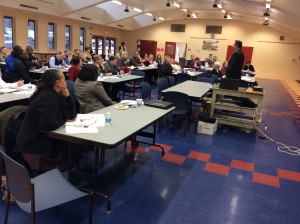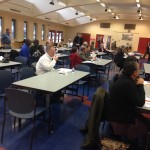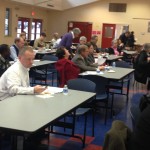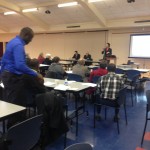
When Disaster Hits Home: Are We Prepared?
Montgomery County Executive’s Faith Community Working Group hosted on Dec. 2 a free two-hour security training session When Disaster Hits Home: Are We Prepare? at Adat Shalom in Bethesda.
 Two experts talked about different scenarios and best practices to protect congregations from unexpected acts of violence, and emergency plans to conduct during natural disasters whether at work or home.
Two experts talked about different scenarios and best practices to protect congregations from unexpected acts of violence, and emergency plans to conduct during natural disasters whether at work or home.
Speakers Brian D Johnson, director of campus security at the Jewish Federation of Greater Washington, and Marlowe Leafty, emergency preparedness specialist for Seneca Maryland Stake of Church of Jesus Christ of Latter-Day Saints, shared information about building safety, and family and staff preparedness.
“Every family needs to have some type of (emergency) plan,” Leafty said.
Leafty said disasters are devastating, but are happening more frequently so it is important to be prepared.
He added that family preparedness should be a “unique” plan on how family members would act in case of an emergency.
“If you can’t get home after a disaster … how long is going to take you to get home? How are you going to reach your family? … Who are you going to talk to …if you get separated?,” he said.
Leafty added that it is essential to keep documents such as birth certificate, health insurance information, and policy numbers readily available.
“Things to consider to have in a central location where you can grab … at least copies of important documents that you can take with you,” he said.
Attendees had the chance to ask questions and take notes about the best approach when it comes public safety.
Johnson said it’s critical to have an emergency plan in place, but added “no matter what you do is never going to be perfect.”
The former U.S. Marine Military Police said having a “great” relationship with a community law enforcement officer, and asking them to do a security assessment can provide relevant information about an institution’s emergency plan.
“Meet with the captain, major, lieutenant … I would encourage to engage [with them],” Johnson said.
He added that members of the community must be vigilant; watch for suspicious people; ask proactive questions, and think of what would the law enforcement need in case someone needed to call 911.
“If you see something, say something. … A license plate number, when something happens that’s the type of information you want to look for,” Johnson said.
The event was also sponsored by the Jewish Community Relation Council. For more information, email fcwg2013@gmail.com.








Engage us on Facebook
Follow us on Twitter
Tweets by @mymcmedia